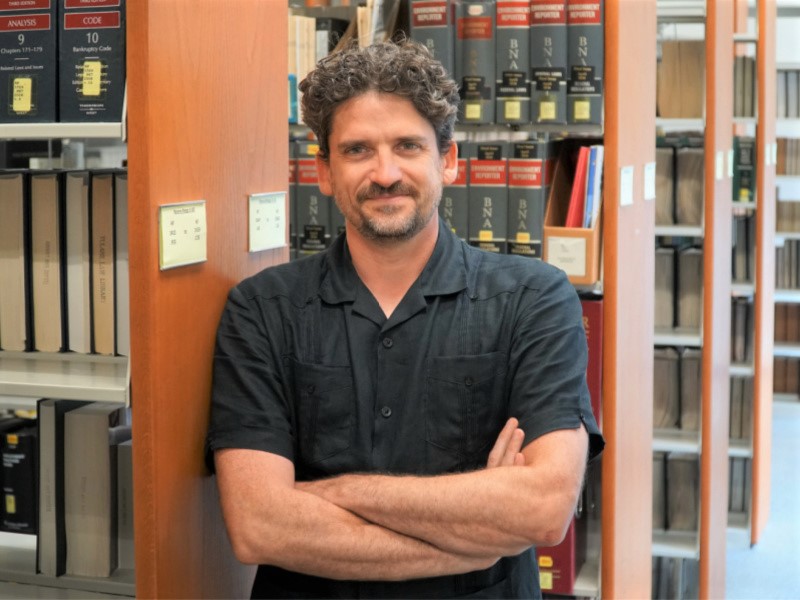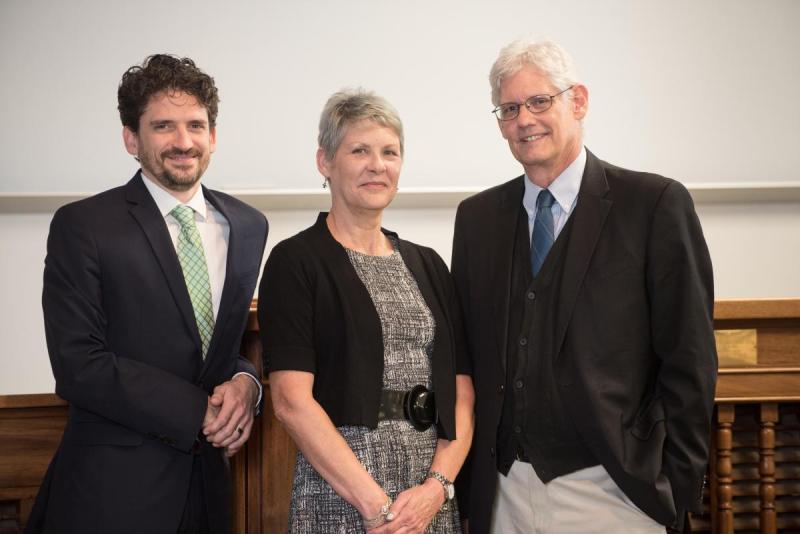Home / Law alum, professor to lead Tulane Institute on Water Resources Law and Policy
Law alum, professor to lead Tulane Institute on Water Resources Law and Policy
June 21, 2023 2:45 PM
|

Since his arrival in New Orleans as a student at Tulane Law School in 2009, Christopher Dalbom feels like “I’ve never really had to leave campus.”
And Tulane has been the better for it.
Now Professor Dalbom will take the reins of Tulane’s Institute on Water Resources Law and Policy next month as its Director, continuing to be in the thick of research in environmental law – and the Institute – work that began in his second year of law school when he was a student researcher.
After graduation in 2012, he became a postgraduate research fellow and later a program manager there. In 2018, he was tapped to become Assistant Director, working under the leadership of Professor Mark Davis, a nationally-recognized researcher in water law, whom he is succeeding as Director.

administrator, Jane Johnson.
All the while, Dalbom has been teaching, mentoring and creating spaces for students and others to follow their passion at the intersection of environmental issues and the law.
“I’ve been lucky to have my work combine my passions of serving my adopted home of Louisiana and other similarly situated places and of teaching and creating spaces for others to exercise similar passions, problem-solving, and innovation,” said Dalbom, who also serves as Assistant Director of the Tulane Center for Environmental Law and the Deputy Faculty Director of the Law School’s online Master of Jurisprudence programs in Environmental and Energy Law.
“I feel very lucky to get to contribute to creating a generation – or two – of lawyers who can rise to the challenges of the 21st century while also working on addressing those challenges as they shift from theoretical to undeniable,” said Dalbom.
His time at Tulane as both student and educator has elevated Tulane Law’s expertise in water law in many ways. Dalbom is a regular go-to expert for media on issues related to water and environmental crises due to climate change. A regular contributor to the weekly TUWaterWays newsletter for the past 11 years (you can sign up for it here), Dalbom has written or contributed to scores of studies, articles and papers on the Corps of Engineers, sustainability of coastal communities, the public trust doctrine, and disaster recovery.
He and Davis’ collaborations have set Tulane Law – and the university – apart. Water law, a niche of environmental and property law, is more important than ever. As the nation struggles with water rights, such as the West’s battles over the management of the Colorado River, or with aging infrastructure that fails to provide clean drinking water in communities to how man-made diversions are aggravating the impact of climate change, Dalbom and Davis have placed Tulane at the forefront of these issues.
Furthermore, the students they’ve taught and mentored have gone on to careers that set policy: In Louisiana alone, there are Institute alumni who are leading the state’s coastal restoration efforts, advising the governor and other policy leaders, creating the state’s first-ever Climate Action Plan and addressing environmental injustices. Many are working across the country in law firms and legislative roles, and with nonprofits, including the Audubon Society.
“I may be biased, but I don’t think anything is as important as water,” he said. “Besides the whole thing about it making life on Earth possible, from floods and droughts to pollution and war, if there’s one thing I’ve learned from the past 11 years and over 500 issues of TUWaterWays, is that how we interact with water is a vital matter, and how we do that is dictated by our laws and policies.”
A native of Kansas who received his undergraduate degree at the University of Kansas, Dalbom moved to Louisiana to attend graduate school at Louisiana State University – the plan was that he would teach geography someday. Luckily, he reconsidered that idea even as he navigated the culture shock that is southeastern Louisiana.
“It was culture shock until I came to understand south Louisiana as an extension of the Caribbean,” Dalbom said.
He studied cultural geography and learned he wanted to do more applied work, which led him to El Salvador through the Peace Corps where he was a youth development volunteer and rediscovered his passion for environmental work.
“I loved geography because it felt like a discipline of study that touched on every aspect of life,” said Dalbom. “I feel lucky that I’ve found that again, not only with law and policy but also with water. Water, and how we interact with it, determines everything that is possible today and everything that is going to be possible tomorrow. From our very survival to a just energy transition to every good and service that makes life easier, water law and policy have a huge role to play. The more we pay attention to it and understand how it can be best stewarded, the less calamitous our future can look.”
And he has big plans for the Institute, among them raising funds to increase staffing and to do more applied research.
“We will continue to forward justice for all people as it relates to water,” he said. “Specifically, I would like for the Institute to make use of Tulane’s deep connections with Latin America and international and comparative law to engage water law experts across the hemisphere. It’s an area that needs to be addressed and that many students have already expressed an interest in.”
And although he may be a top environmental lawyer and expert, Dalbom is …multifaceted. In 2011, he joined the ranks of “ordinary men, extraordinary moves” which to every New Orleanian means he’s got a spot in the internationally-beloved 610 Stompers, a carnival marching group of men whose dancing is lovably – and – comically self-taught.

“If you see me in the Stompers, I can’t promise I’ll be dancing well, but I’ll definitely be dancing hard,” he assures.
He has trained in capoeira since 2009 and been a stranded marine mammal rescue volunteer with the Coastal Wildlife Network at Audubon Nature Institute since joining efforts to rescue dolphins stranded inland by the hurricanes of 2020.
He’s a DJ too, packing them onto the dance floor at friends’ weddings, “because I only do it for friends, so I can spend (perhaps too much) time tailoring the music to the lucky couple.”
New Orleans, too, gave Dalbom his beloved – his wife of 16 years, Samantha Euraque, who works with the state on public health issues related to HIV and STI. They have two kids, Isabel, 13, and Anderson, 9.
His new job at Tulane leading the Institute is happening at a crucial time, and he is ready for the challenge.
“I wholeheartedly believe the work we do at the Institute and the students and young lawyers we train can make a huge impact on the course of the 21st Century, and I look forward to seeing everything they can do.”